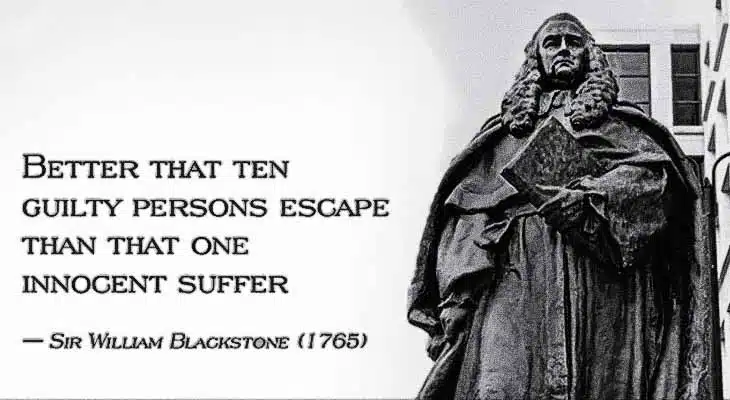The Alex Murdaugh trial is what happens when a jury doesn’t understand reasonable doubt and the judge has a grudge.
FACT-CHECK GUARANTEE (References): [Academic journals: 2 sources] [Straight from the source: 2 sources]
| By Richard Ahern – The month-long double murder trial of disgraced lawyer Alex Murdaugh has concluded — and I was shocked by the outcome.
After three hours of deliberation, the jury unanimously found him guilty of killing his wife, Maggie, and their 22-year-old son, Paul. The following day the judge hammered Mr. Murdaugh with two life sentences and no possibility of parole.
Being convicted of such a crime in South Carolina could land you on death row; however, the state did not pursue the death penalty in this case.
A judge with a grudge?
Judge Clifton Newman did not question the state’s decision, but his opinion was crystal clear. The judge scolded the now-convicted former lawyer, saying, “Over the past century, your family, including you, have been prosecuting people here in this courtroom, and many have received the death penalty. Probably for lesser conduct.”
Judge Newman, the nephew of civil rights activist Isaiah DeQuincey, pulled no punches with the Murdaugh family — one could almost say he had a grudge. During sentencing, he said he removed a portrait of Alex Murdaugh’s grandfather that hung at the back of the courthouse.
The Murdaugh family has been a prominent name in the legal community of the Lowcountry, South Carolina. The family has controlled both sides of the law, owning a thriving private law firm and prosecuting criminal cases for the state.
Undoubtedly, Alex Murdaugh has destroyed the family name and is guilty of many crimes, including theft and staging his own murder. He was thrown out of his family law firm when it was discovered he had been stealing from clients for well over a decade, in part to fuel a rampaging addiction to oxycodone (a powerful opiate).
Murdaugh acknowledged his financial crimes — but said he would “never hurt” his wife and son.
Richard “Alex” Murdaugh was accused of shooting his wife with a rifle and shooting his son with a shotgun on 7 June 2021. The evidence that tied him to the murders was circumstantial, but he was a proven liar and thief, and the prosecution used that masterfully against him.
There was little concrete evidence against him, no fingerprints on murder weapons, and no blood on his hands (literally). Some evidence even swung in his favor, such as the angle of fire was upwards, suggesting the shooter was on the shorter side — Mr. Murdaugh is 6’4.
The fact that two different types of guns were used suggested a second shooter and that Maggie Murdaugh’s phone was found in a different location, indicating the suspect had fled the scene.
The prosecution’s motive was flakey at best, theorizing Murdaugh killed his wife and son to garner sympathy and distract the community from his financial crimes.
The investigators were also heavily criticized for mishandling the investigation, letting the crime scene get washed by rainfall, and failing to collect proper DNA evidence.
All that led me to believe that although Mr. Murdaugh was an obvious suspect — finding him guilty, beyond all reasonable doubt, seemed a stretch.
Remember the burden of proof …

Beyond a reasonable doubt is exclusively used in criminal cases and is the highest burden, stating that a defendant is always presumed innocent and must only be found guilty if there is no other reasonable explanation from the evidence.
Beyond a reasonable doubt stems from Blackstone’s ratio, named after English jurist William Blackstone, who said, “Better that ten guilty persons escape than that one innocent suffer.” This was published in 1760 and, to this day, forms the bedrock of criminal law across the globe.
Benjamin Franklin went even further: “It is better a hundred guilty persons should escape than one innocent person should suffer.”
A jury must be virtually certain of guilt — yet, in this case, I can see other reasonable explanations.
By contrast, in a civil trial, based on the preponderance of the evidence, which is a certainty greater than 50%, I would convict Mr. Murdaugh in a heartbeat.
So, why the guilty verdict?
Firstly, it cannot be denied that this was a media spectacle from the start — Netflix made a documentary about the family — what more needs to be said?
The show named “Murdaugh Murders: A Southern Scandal” milked the story of a wealthy, prominent lawyer that belonged to a family that was above the law for over a century that finally got what he deserved.
A fall from grace. The downfall of the powerful. Who doesn’t love that?
The prosecution piggybacked on that narrative, reminding the jury of the wealth and prominence Alex Murdaugh once enjoyed. He was a man who earned over a million dollars a year, but greed drove him to steal from his clients, including children, the disabled, and the dying.
The defense repeatedly objected to the constant questioning about Murdaugh’s financial crimes, arguing it was not relevant to the murders. But almost every time, they got struck down with “objection overruled” from the judge.
Murdaugh’s credibility was demolished to the point that he could have said water was wet, and the jury wouldn’t have believed him.
That’s what got him halfway to a guilty verdict — the other half was pure stupidity.
Alex Murdaugh was an idiot to lie about his whereabouts before the murders, only for a video to appear proving he was with Maggie and Paul minutes before the murders. He was also an idiot for referring to his son as “Paw Paw” on the stand. Oh, the cringe!
Alex Murdaugh dug the rest of his grave with his insincere testimony, but after all that, he could be an innocent man because the evidence is inconclusive.
Straight from the juror’s mouth:
A jury member immediately spoke out after the verdict and unsurprisingly said the reasons for the verdict were the lies: about his whereabouts and everything else. The juror said he looked right at the defendant and didn’t believe anything he said.
“He didn’t cry…. all he did was blow snot” — Juror who convicted Alex Murdaugh.
Sums it up perfectly. But when all is said and done, have we just convicted a man of murder who is only guilty of lying (and theft)? Perhaps we should ask ourselves if this is another example of the pendulum swinging too far the other way.
Were the jury and the judge biased toward Alex Murdaugh because he was once so powerful?
It’s human nature to want to see the big guy fall; it’s why the story of David and Goliath has echoed through history — but it’s a tragedy for all of us when an innocent man is found guilty.
We need YOUR help! We bring you the uncensored news for FREE, but we can only do this thanks to the support of loyal readers just like YOU! If you believe in free speech and enjoy real news, please consider supporting our mission by becoming a patron or by making a one-off donation here. 20% of ALL funds are donated to veterans!
This article is only possible thanks to our sponsors and patrons!

Join the discussion!